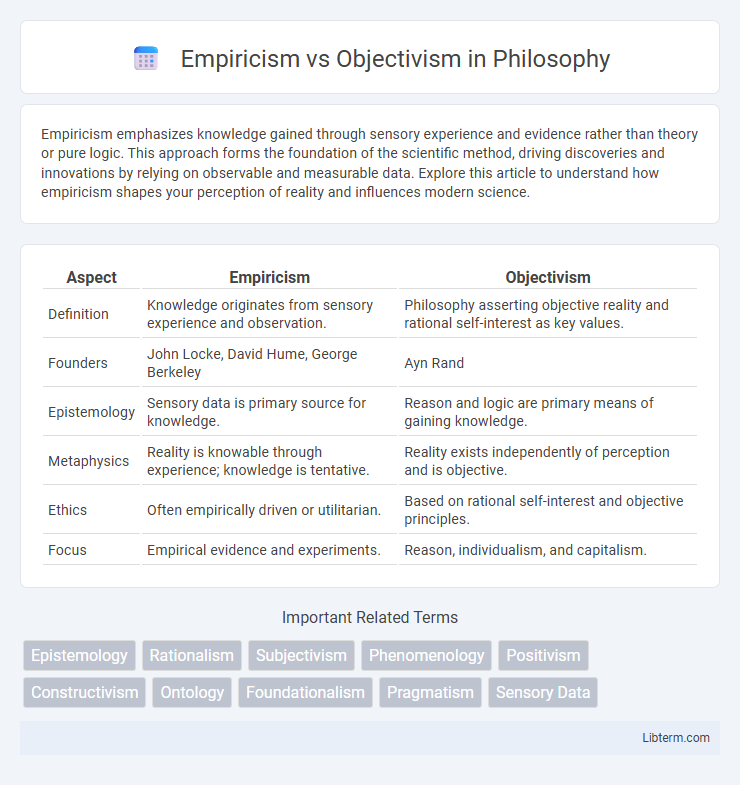Empiricism emphasizes knowledge gained through sensory experience and evidence rather than theory or pure logic. This approach forms the foundation of the scientific method, driving discoveries and innovations by relying on observable and measurable data. Explore this article to understand how empiricism shapes your perception of reality and influences modern science.
Table of Comparison
| Aspect | Empiricism | Objectivism |
|---|---|---|
| Definition | Knowledge originates from sensory experience and observation. | Philosophy asserting objective reality and rational self-interest as key values. |
| Founders | John Locke, David Hume, George Berkeley | Ayn Rand |
| Epistemology | Sensory data is primary source for knowledge. | Reason and logic are primary means of gaining knowledge. |
| Metaphysics | Reality is knowable through experience; knowledge is tentative. | Reality exists independently of perception and is objective. |
| Ethics | Often empirically driven or utilitarian. | Based on rational self-interest and objective principles. |
| Focus | Empirical evidence and experiments. | Reason, individualism, and capitalism. |
Introduction to Empiricism and Objectivism
Empiricism is a philosophical doctrine emphasizing that knowledge originates primarily from sensory experience and evidence gathered through observation and experimentation. Objectivism, founded by Ayn Rand, advocates for objective reality and rational self-interest as the basis of knowledge, emphasizing reason over emotions or subjective feelings. Both frameworks address the nature of knowledge but differ fundamentally in their sources: Empiricism relies on experiential data while Objectivism prioritizes logic and objective reality.
Historical Origins and Key Philosophers
Empiricism, rooted in the 17th-century works of John Locke and David Hume, emphasizes knowledge derived from sensory experience and evidence, shaping modern scientific inquiry. Objectivism, founded by Ayn Rand in the 20th century, promotes rational self-interest and objective reality as the basis of knowledge, opposing subjective interpretations. Both philosophies contrast in their epistemological approaches: empiricism prioritizes experience and observation, while objectivism values reason and logic as the primary means of understanding reality.
Core Principles of Empiricism
Empiricism centers on the principle that knowledge arises primarily from sensory experience and observation, emphasizing evidence gathered through the senses as the foundation of understanding. It asserts that the human mind starts as a blank slate, or tabula rasa, acquiring ideas and concepts through empirical data rather than innate knowledge. Key figures like John Locke, George Berkeley, and David Hume advocate that all valid knowledge must be verifiable through experience and experimentation.
Core Principles of Objectivism
Objectivism centers on the core principles of objective reality, reason as the only means of acquiring knowledge, and rational self-interest as the ethical foundation. It asserts that reality exists independently of consciousness, and individuals must use logic and evidence to understand it. Ethical egoism in Objectivism promotes pursuing personal happiness while respecting the rights of others.
Methods of Knowledge Acquisition
Empiricism emphasizes knowledge acquisition through sensory experience and observation, relying on evidence gathered from the external world to form concepts and validate theories. Objectivism advocates for reason as the primary method of gaining knowledge, asserting that logical deduction and objective reality are fundamental to understanding existence. Both approaches underscore systematic analysis, but empiricism depends on empirical data while objectivism prioritizes rational comprehension.
Reality and Perception: Differing Views
Empiricism asserts that reality is understood primarily through sensory experience and observation, emphasizing that knowledge derives from empirical evidence. Objectivism maintains that reality exists independently of perception, advocating for an objective reality governed by reason and logic, accessible through rational thought rather than sensory experience alone. These differing views highlight the empirical reliance on observation versus objectivism's focus on objective, reason-based reality.
Science and Rationality in Both Frameworks
Empiricism emphasizes knowledge acquisition through sensory experience and observation, forming the foundation of the scientific method by prioritizing experimental data and evidence. Objectivism upholds reason and logical analysis as the primary means of understanding reality, advocating for rational principles derived from objective reality rather than subjective experiences. Both frameworks value rationality, but empiricism relies on empirical verification, while objectivism stresses conceptual clarity and logical consistency in the pursuit of scientific knowledge.
Criticisms and Limitations
Empiricism faces criticism for its reliance on sensory experience, which can be subjective and prone to error, limiting its capacity to provide absolute knowledge. Objectivism is often criticized for its rigid adherence to rational self-interest and objective reality, potentially overlooking the complexity of human emotions and social contexts. Both philosophies struggle with addressing the full scope of human understanding, as Empiricism undervalues innate knowledge while Objectivism may neglect the importance of experiential learning.
Practical Applications in Modern Contexts
Empiricism grounds practical applications in evidence-based observation, crucial for scientific research, data analytics, and experimental methodologies. Objectivism emphasizes rational self-interest and objective reality, influencing modern business ethics, policy-making, and personal development strategies. Integrating empiricism's focus on observable data with objectivism's principles of reason facilitates effective decision-making in technology innovation, healthcare, and leadership.
Conclusion: Weighing Empiricism Against Objectivism
Empiricism emphasizes knowledge through sensory experience, grounding truth in observable and testable phenomena. Objectivism champions reason and objective reality, asserting that reality exists independently of perceptions and that rational analysis leads to true understanding. Balancing Empiricism and Objectivism involves recognizing empirical evidence's value while upholding logical consistency and objectivity in interpreting facts.
Empiricism Infographic

 libterm.com
libterm.com